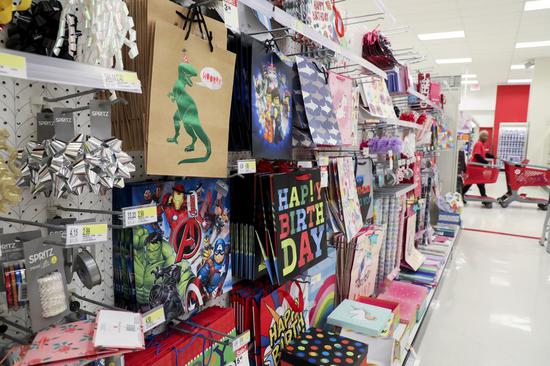
Gift bags made in China are seen at a Target store in New York, the United States, May 20, 2019. (Xinhua/Wang Ying)
Chinese companies have not been lowering prices in order to offset additional U.S. tariffs, and American firms and consumers are paying the added cost, a new study by Federal Reserve Bank of New York has shown.
In annualized terms, U.S. tariff revenues were roughly 40 U.S.-billion dollars higher in the third quarter this year compared with the second quarter of 2018, before the additional tariffs were levied on Chinese imports, according to the study released Monday.
The study found that import prices for Chinese goods "seem unaffected" by the additional tariffs, meaning that Chinese companies have not been lowering their prices to offset tariffs.
Prices on goods from China fell by only 2 percent in dollar terms between June 2018 and September 2019, the New York Fed study showed, noting that this drop is "a small fraction" of the amount required to offset the increase in tariff rates.
Moreover, prices on goods purchased from Mexico and the so-called newly industrialized economies, such as South Korea and Singapore, have fallen by roughly the same amount, suggesting that this small drop is the result of general market conditions rather than the increase in tariffs, the study said.
The continued stability of import prices for goods from China means U.S. firms and consumers have to pay for the tariff tax, the study concluded.
Who pays the tariff tax depends on how it is split between lower profit margins for wholesalers, retailers, and manufacturers and higher prices for consumers, the study said, adding that estimating this split is difficult.
The U.S. goods trade deficit narrowed to 66.5 billion dollars in October as imports plunged, data from the U.S. Census Bureau showed Tuesday.
Analysts said the large decline in imports last month might reflect the impact of new U.S. tariffs on imported products from China.
Robert Kaplan, president of the Federal Reserve Bank of Dallas, said in an interview with CNBC on Tuesday that he expected U.S. economic growth to "be weak" in the fourth quarter this year as businesses cut inventories "due to trade uncertainty."


















































